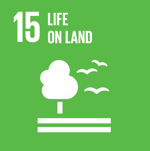Plant-pollinator interactions are known to vary across time, however, most studies have been conducted in temperate areas. Tropical plant-pollinator interactions are potentially more stable, since floral resources are available year-round, particularly in cultivated environments such as city parks. The objectives of this study were thus to examine the interactions between flowering plants and their potential pollinators in a large, tropical city (Bangkok, Thailand) across 12 consecutive months, and to assess the stability of these interactions over time. We conducted monthly pollinator observations at 9 parks spaced throughout the city, and collected data on temperature, precipitation, floral abundance and floral species richness. We found floral abundance, floral richness, and precipitation influenced urban pollinators. We also found that the network interaction structure did not change across months, even as species composition did. We conclude that the year-round constancy of floral resources and climate conditions create a stable environment for urban pollinators. The results of this study provide useful information about how tropical pollinators respond to urban environments. This research addresses SDG 15 to “protect, restore and promote sustainable use of terrestrial ecosystems… and halt biodiversity loss.”

Stewart AB, Waitayachart P. 2020. Year-round temporal stability of a tropical, urban plant-pollinator network. PLoS ONE 15(4):e0230490.


